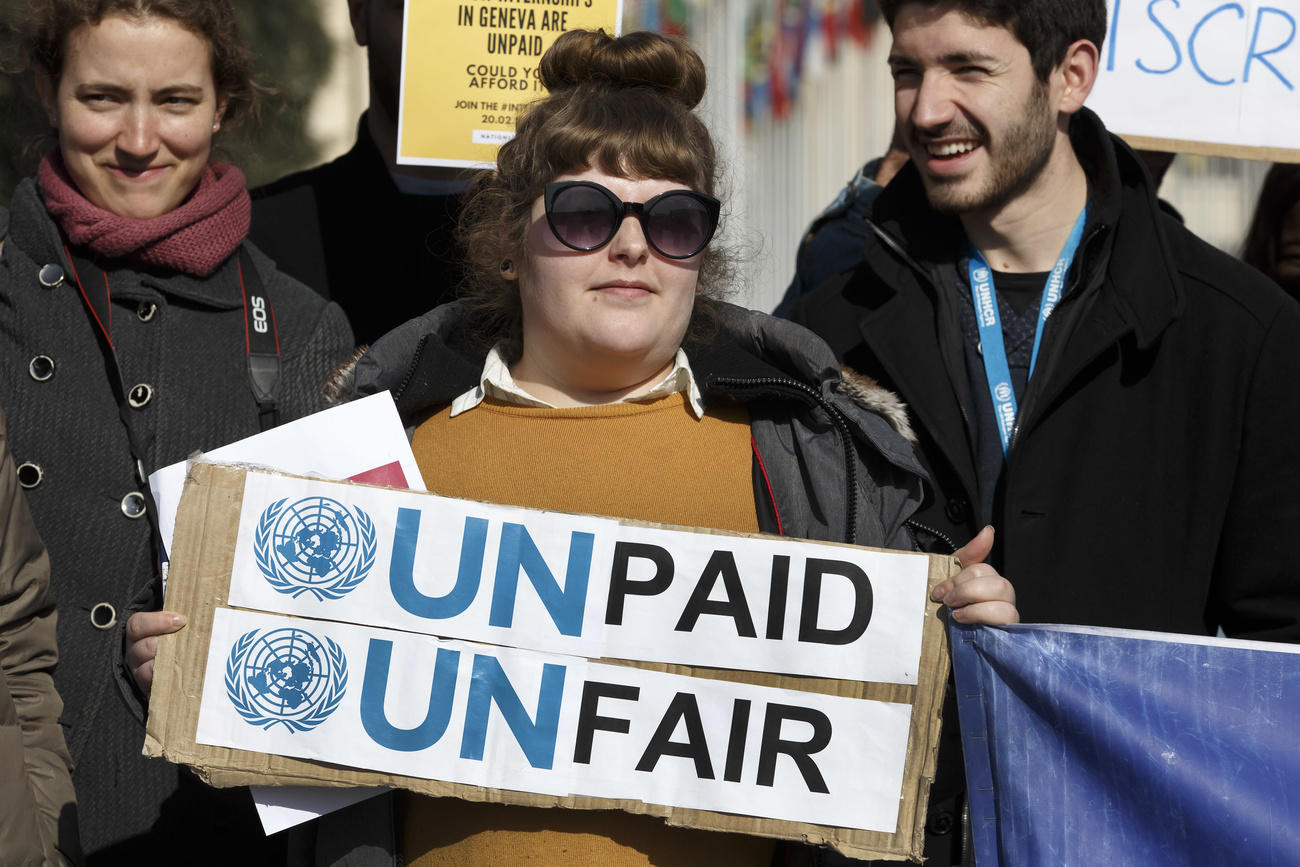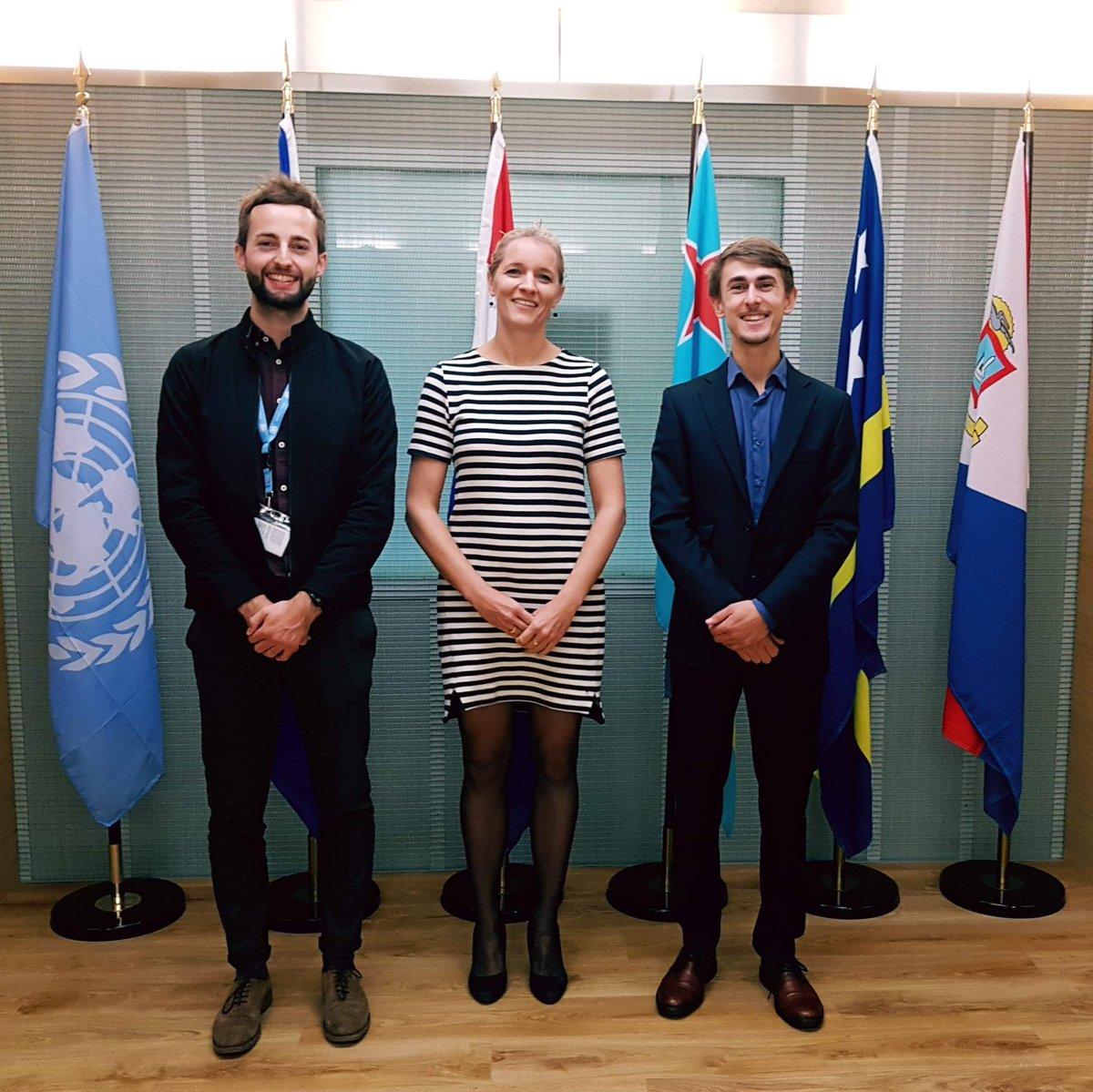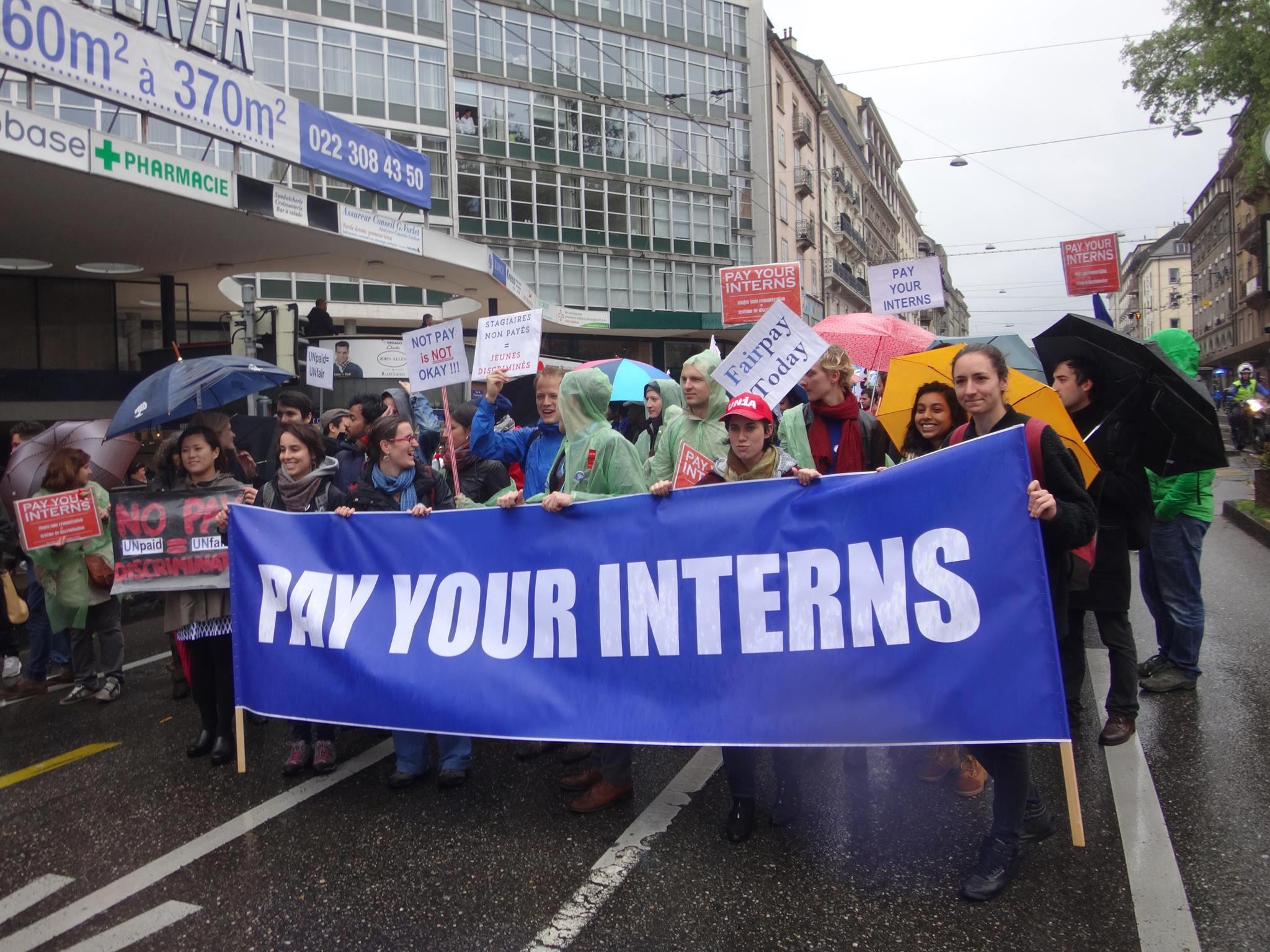Unpaid, disempowered and overworked
The United Nations Secretariat must lead by example in its efforts to reduce inequalities and offer young people fair, quality paid internships, writes the Fair Internship Initiative (FII) advocacy group.
Since 2015, the Fair Internship Initiative (FII),External link a global advocacy platform composed of motivated interns and young professionals from across dozens of UN agencies, has been leading advocacy efforts to reform the UN internship programme. The mission of FII is simple: to ensure the United Nations fulfils the principle, contained in its own charter, to grant equal opportunities for all to participate in its institutions.

In a small UN agency office fit for one person, three desks are shared between a team of five young people still diligently working past 6pm. Their boss, an upper-level staff member, has left for home after assigning work for the next morning.
Their female boss’s base salary is a comfortable $240,000 (CHF238,600) per year, while four of her five full-time team members are unpaid…
This is part of a series of opinion pieces by young interns about their experiences living and working in Geneva.
According to UN reports, income inequality is on the rise – the richest 10% of the population have up to 40% of global income, whereas the poorest 10% earn between 2-7%. In order to address this problem, the UN and its member states have included a specific goal (Goal 10) in the 2030 Agenda for Sustainable Development aimed at “reducing Inequalities within and among countries” by 2030.
In a world still reeling from the effects of the 2008 global financial crisis, there are now fewer jobs available to the largest population of young people our world has ever known, a gap being filled by millions of (often unpaid) interns hoping to gain relevant work experience and an upper-hand in an increasingly competitive job market. It is no coincidence that the number of unpaid interns in the UN Secretariat alone grew from 1,516 in 2006 to almost 2,200 in 2017, a trend that has continued in parallel to diminishing numbers of junior positions.
In a recent global survey of UN interns, around half reported experiencing housing insecurity and a third could not afford enough food. Testimonies were frequently characterized by skipping lunch and commuting more than a few hours a day, as living within the city of their duty station was financially impossible. Moreover, they reported carrying out tasks and being given responsibilities similar to those of fellow staff.
As one unpaid UN intern described: “My responsibilities are similar to those carried out by junior consultants or low-level professional staff, including writing funding proposals, going on mission to support project activities and writing reports.”

More
The lessons of living in Geneva as an intern
While those who manage to get a foot in the door often face poor conditions of service, many more simply cannot even consider an unpaid internship in the UN. Last year, the UN High Commissioner for Human Rights stated in its report (A/HRC/40/31)External link on youth and the right to work that “unpaid internships (…) exclude de facto the most marginalized who cannot afford to work without remuneration” and “limit young people’s freedom to choose.” For this reason, they “should be replaced by paid ones.”
Nevertheless, the UN Secretariat’s policy still prohibits any form of support for interns to cover living costs, medical insurance and travel arrangements, which are often prohibitive to most, especially in cities like Geneva or New York. It is therefore not a coincidence that – according to UN official dataExternal link – 50% of the Secretariat’s interns come from just seven (mostly high-income) countries. At the same time, survey data collected by the Fair Internship InitiativeExternal link, show considerable socioeconomic inequality, as an intern mostly relies on their family’s contributions to cover living expenses. Should the family be unable to shoulder the costs, an internship in the UN remains just a dream.
The ongoing UN reform, pioneered by Secretary-General António Guterres since the start of his term in 2017, has the revision of UN management as one of its cornerstones. And yet a reform of the internship programme remains for now outside the Secretariat’s strategy. This is despite a commitment to do so in the UN Youth Strategy, approved in 2018, and an explicit recommendation in this sense from the 2018 review of the UN internships programmes by the Joint Inspection Unit (JIU), the only independent external oversight body of the UN.
The JIU report (JIU/REP/2018/1External link), prepared by Inspector Jean Wesley Cazeau, recommends granting interns basic rights such as access to justice mechanisms, annual and sick leave entitlements, and a stipend to enable equal participation and opportunities for young people from diverse geographic and socio-economic backgrounds.
Discussions on this report, which were postponed last year, resumed at the recent UN General Assembly’s Financial Committee (so-called “Fifth Committee”) and create a new momentum for policy change in advancing intern rights. It may be that, for the first time, there is a glimmer of hope on the horizon that fair, accessible and quality internships might finally become a reality.
In consultation with over fifty member states, the Fair Internship Initiative is advocating for a resolution that urges the UN Secretary-General to review the organization’s internship programme with an aim to value and empower young people interning or wishing to intern in the UN by giving them basic rights and the necessary means to support themselves.

Some ten years ago, even the thought of paying UN interns felt dubious and unattainable to most. Yet, an increasing number of UN agencies outside of the UN Secretariat are providing a living allowance (and thus equal opportunities) to their interns. While some have been doing so for several years, like the International Labour Organization (ILO), more have followed in recent years, such as the UN Office for Project Services (UNOPS), the United Nations Children’s Fund (UNICEF) and the UN Refugee Agency (UNHCR).
In 2018, the World Health Assembly unanimously adopted a resolution requesting WHO to provide financial support to all interns and increase diversity of interns’ population – an important reform which will come into effect as of January 2020.
In November this year, UN Women will also start paying a stipend to all interns, to be followed by the UN Development Programme as of January 2020. While questions remain whether this support will be enough to ensure equal opportunities, it is nevertheless an important step forward.
Meanwhile, despite Guterres’s vigorous approach to reform the UN, the Secretariat is falling behind on its own commitments to youth empowerment and the implementation of the UN Charter. As more and more UN agencies upgrade their internship policy to ensure equal opportunities to disadvantaged youth, the Fair Internship Initiative remains committed to achieving a truly inclusive UN, and the need for the UN Secretariat to lead by example in the efforts to reduce inequalities.
The views expressed in this article are solely those of the author, and do not necessarily reflect the views of swissinfo.ch.
Opinion series
swissinfo.ch publishes op-ed articles by contributors writing on a wide range of topics – Swiss issues or those that impact Switzerland. The selection of articles presents a diversity of opinions designed to enrich the debate on the issues discussed.

In compliance with the JTI standards
More: SWI swissinfo.ch certified by the Journalism Trust Initiative











You can find an overview of ongoing debates with our journalists here . Please join us!
If you want to start a conversation about a topic raised in this article or want to report factual errors, email us at english@swissinfo.ch.